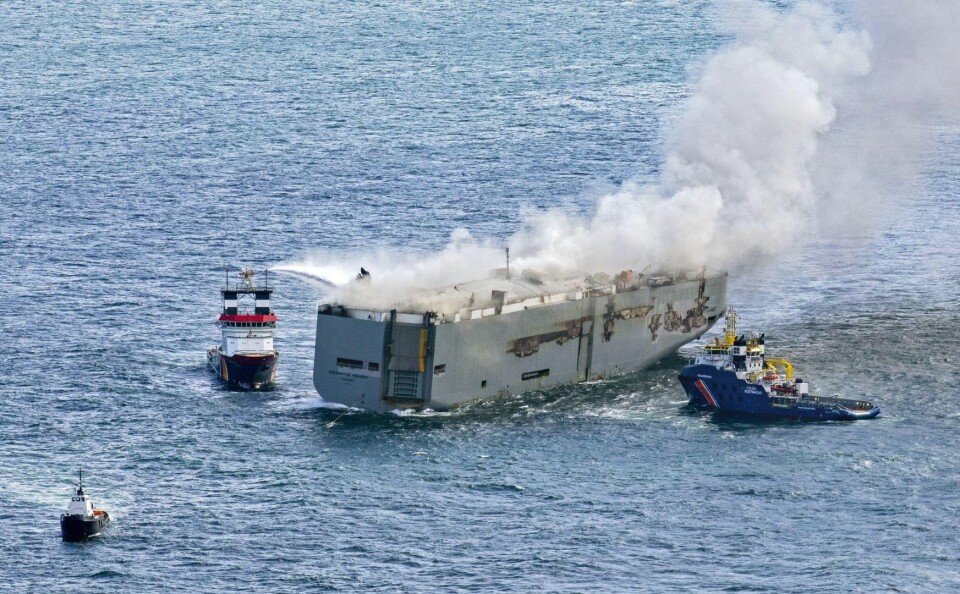-
Calais and Dunkirk ports strive for all-electric ferry-crossings
Battery-powered ships will recharge in less than 45 minutes
-
Good news for electric car owners in France as thousands more charging stations to be installed
MPs recently rejected plans to bring forward ban on petrol vehicles
-
Why repairing your car in France is becoming increasingly expensive
The cost has soared by more than 25% since 2020, with electric vehicles most dear, a new report has shown
UK-France ferries take steps to reduce electric vehicle fire risk
As an investigation examines whether an electric car battery started a cargo ship fire, we look at the safety measures on Channel ferries

A fire aboard a cargo ship off the coast of the Netherlands, believed to have started with an electric car, has raised safety concerns over the transportation of electric vehicles.
A reader contacted us to ask about the possible implications for cross-Channel ferry companies and electric cars.
The Fremantle Highway had 3,783 vehicles onboard, including 498 electric vehicles, when the fire broke out, resulting in the death of a crew member.
The cause is not yet known but Dutch broadcaster RTL released a recording in which an emergency responder can be heard saying the fire began with the battery of an electric car.
Conflicting assessment of risk
A recent report from Allianz claimed that lithium-ion batteries pose a “growing risk” for car carriers, with fires mostly resulting from “substandard manufacturing or damaged battery cells or devices, over-charging and short-circuiting”.
However, the Confederation of Fire Protection Associations Europe wrote last year: “According to studies from both Denmark and Norway, there is actually less risk of fire in electric and hybrid cars than in conventional cars.
“The only problem is that when it does happen, the consequences can be greater, because fire in a lithium battery is difficult to extinguish and can flare up again long after it has been extinguished.”
It quoted a project manager with the Danish Institute of Fire and Security Technology, who said that “fires in electric cars on ferries are manageable and not something we need to fear”, following extensive testing.
Read more: Driving in France: Readers’ views on switching to electric
Brittany Ferries treats electric vehicles differently onboard
Tom Bartosak-Harlow, director of communications for the UK Chamber of Shipping trade association, said: “Fires in ferries are thankfully incredibly rare, but ferry companies do have clear safety procedures in place to make sure we are minimising risks should a fire break out.”
Precautions include sprinkler systems, and various operators have taken measures specifically related to electric vehicles.
“These could include patrols of vehicle decks looking for issues. Some mark electric vehicles as they’re boarding [this is the case with Brittany Ferries], with a windscreen sticker, for example, to show they are to be placed appropriately, perhaps near a fire suppression system.”
It is not currently possible to charge an electric car on ferry services between England and France, although Irish Ferries offers charging points on its Dublin-Cherbourg WB Yeats ferry – provided that passengers pre-book their space at an additional charge. Some ports have charging points nearby (see openchargemap.org).
Read more: French firm invents kit to convert petrol cars into plug-in hybrids
Special firefighting equipment and training
The Chamber of Shipping is planning to publish industry guidance later this year based on what operators are already doing, allowing them to share best practices.
A spokesman for Danish company DFDS, which runs several routes across the Channel, told The Connexion it had bought firefighting equipment for fires in ‘alternative fuelled vehicles’ (AFVs) and placed this on board all DFDS ships.
“DFDS has made special e-learning training for awareness and knowledge about fires in AFV-vehicles for all deck and engine officers.”
The ferries also have CCTV and regular fire patrols by the crew on car decks, as well as automatic fire detection systems. Damaged electric vehicles are not allowed onboard.
The spokesman highlighted differences between the Freemantle Highway and its passenger vessels, which “have water-based sprinkler systems on the car decks, whereas car carriers typically only have CO2 systems for putting out fires on their car decks.
“A water-based sprinkler system is better than a CO2 in many ways: with a CO2 system, you can only release the system once to fight the fire, whereas the water sprinkler system allows you to use an unlimited amount of seawater.”
Norwegian company bans EVs on its ferries
Earlier this year, Norwegian shipping company Havila Kystruten decided to ban electric and hybrid vehicles from its ferries.
With electric vehicles becoming increasingly prevalent, Mr Bartosak-Harlow said the industry in the UK is not currently considering similarly drastic measures.
“Electric vehicles are different to the cars we’ve had previously. If you think about the history of shipping, new technologies come along all the time. This is another challenge of the kind the industry is used to facing.”
Related articles
French ferry passenger dies after his car falls into the sea in storm
Yacht gives holidaymakers green ferry option in France
Channel ferry crews to be better protected by new French and UK laws
























